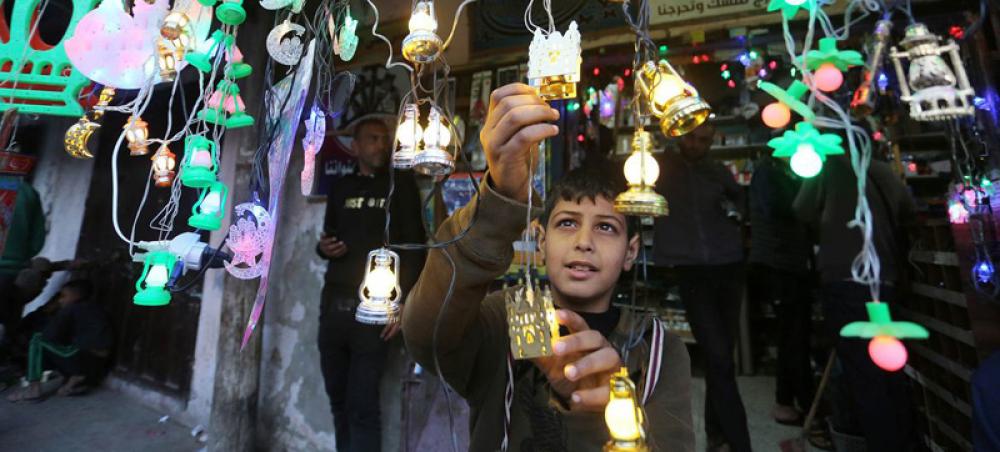Just Earth News | @justearthnews | 15 Mar 2024, 11:41 pm Print
 Islamophobia
Islamophobia Photo Courtesy: UNRWA
Amid a rising tide of anti-Muslim hate, top UN officials condemned the scourge on Friday as the General Assembly adopted a resolution to push back against it during commemorations marking the International Day to Combat Islamophobia.
The new resolution, tabled by Pakistan, calls for, among other things, concerted action to fight ongoing violence against Muslims and requests the UN Secretary-General to appoint a special envoy to combat Islamophobia.
The world body created the International Day through a resolution adopted following attacks on two mosques in Christchurch, New Zealand, that left 51 people dead on this day in 2019.
Prior to adopting the new resolution, by a vote of 113 in favour to none against, with 44 abstentions, a divided Assembly rejected by a close margin two amendments proposed by a group of European nations.
The proposals would have replaced key language in the resolution, including calling for a focal point instead of a UN special envoy and removing references to the desecration of the Quran.
Online hate speech ‘fuelling real-life violence’
The UN chief on Friday said “divisive rhetoric and misrepresentation are stigmatising communities” and everyone must unite to combat intolerance, stereotypes and bias.
“Online hate speech is fuelling real-life violence,” Secretary-General António Guterres said in a statement, emphasising that digital platforms must moderate hateful content and protect users from harassment.
Institutional discrimination and other barriers are violating the human rights and dignity of Muslims, and much of this disturbing trend is part of a wider pattern of attacks against religious groups and vulnerable populations, also including Jewish people, minority Christian communities and others, he added.
“We must confront and root out bigotry in all its forms,” he declared. “Leaders must condemn inflammatory discourse and safeguard religious freedom. “Together, let us commit to promoting mutual respect and understanding, foster social cohesion and build peaceful, just and inclusive societies for all.”
‘Faith literacy’ must combat religion-based hate
In Geneva, Volker Türk, UN High Commissioner for Human Rights (OHCHR), said all forms of religious hatred and intolerance are unacceptable.
“The message today is perhaps more urgent than ever: we are all well past the hour to restore peace, tolerance and respect,” he said. “We know that fear breeds hate, ignorance and distrust of the other.”
“Islamophobia has stolen lives,” dehumanising entire communities and sparking “torrents of hate speech, magnified by social media”, he said, citing multiple reports on “huge spikes” in Islamophobic incidents amid the current conflict in the Middle East, with a nearly 600 per cent increase in some countries in North America and Europe.
States must record such incidents and urgently step up their efforts to combat intolerance against people based on religion or belief using the many available tools at their disposal, including the OHCHR guide to developing anti-discrimination legislation.
“Faith literacy – in other words, knowledge and understanding about the values of each religion and belief – is also crucial,” Türk said, urging States to include it as part of comprehensive training initiatives on combating religious hatred for law enforcement officers and the judiciary, faith-based actors, teachers and media professionals.
Anti-Muslim hate spikes
Also in Geneva, Nassima Baghli, Permanent Observer of the OIC, hosted a commemorative event on Friday, saying that “Islamophobia is on the rise following the Israeli aggression on Gaza”.
Citing recent anti-Muslim incidents, she pointed to cases several months ago of the desecration of the Quran.
“Discrimination and stereotypes based on religion or belief are doing a lot of harm as they dehumanise people and prevent them from enjoying their rights,” Baghli said.
“We need to combat these scourges with great resolve with all the tools at our disposal,” she said. “Our common goal is to promote mutual understanding and respect for all.”
UN rights experts: Nobody should fear having a religion
UN independent rights experts raised a range of concerns in a statement issued on Friday, stressing that “States and faith-based actors have human rights responsibilities, and they have to step in to counter such violations” in line with the Rabat Plan of Action and the UN Faith for Rights framework and the #Faith4Rights toolkit to encourage respect for religious diversity.
“Across the world, we have witnessed attacks on mosques, cultural centres, schools and even private property belonging to Muslims,” said the Human Rights Council-appointment experts, who are not UN staff and do not receive a salary.
“During this holy month of Ramadan, we are appalled at the continued refusal by Israel to allow adequate humanitarian assistance and food aid to be provided to the mainly Muslim civilian population in Gaza despite the widespread hunger and signs of severe malnutrition,” the experts said, also raising serious concerns about undue restrictions imposed on access to the Al Aqsa Mosque in Jerusalem and the destruction of a significant number of places of worship in Gaza.
“Nobody should suffer fear for having or manifesting their religion or belief,” they said. “Everyone should feel safe and benefit from the equal protection of their human rights, which must be guaranteed by all States.”
- Viral Irish food bank photo sparks shocking racist attacks on Indians
- Caught on camera: Two foreigners assaulted in Israel in an alleged racial attack
- Pakistan: Parents heartbroken after court sides with man accused of kidnapping minor Christian girl
- Pakistan: Trafficked 35 years ago, Bangladesh-born woman approaches court against FIA for offloading her from flight!
- Hindu tea worker found bound and bloodied in Bangladesh garden during general elections; investigation underway





-1763561110.jpg)
